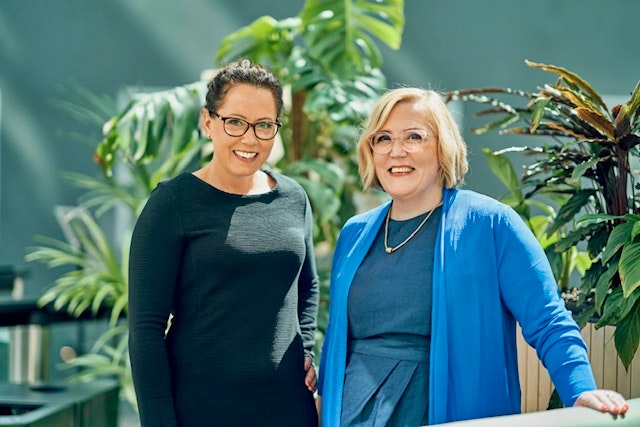What are the hottest opportunities in fintech? And what should every founder know when setting up their own fintech company?
These were just two of the topics discussed in last week’s roundtable, produced in partnership with Mastercard.
Sifted senior reporter Isabel Woodford interviewed a panel of founders and executives about how to scale fintech companies, the challenges founders face and how to deal with competition. Joining us were:
- Amy Neale, senior vice president, fintech & enablers global lead at Mastercard;
- James Lynn, CEO and cofounder at Currensea, which provides open banking-enabled direct debit cards for use abroad;
- Lars Trunin, head of UK product at Wise, which offers low-cost multicurrency transfers;
- Peter Janes, CEO of Shieldpay, a startup aiming to make complex transactions easier.
Here’s what we learned.
1/ Invest in the right infrastructure at the start
Founders should think carefully about setting up the right infrastructure when they start their company, as it can be painful to change it later — this is especially true with scaling fintechs, which often have to navigate things like local regulation as they grow.
Currensea’s Lynn said lawyers, accountants and advisers all count as infrastructure, along with things such as cloud-based tech infrastructure and website hosting.
As Currensea grew, it quickly outgrew its original setup. Lynn said changing the infrastructure was a “painful distraction” from more important tasks like growing the business.
Really invest in getting your infrastructure right from day one. As a scrappy startup you can hack around and do a few bits and pieces. But the cost of not doing it right at the start is so expensive later on down the line” — James Lynn, Currensea
2/ Know when to step away
Shieldpay’s Janes said typically the first 10 people working at a startup will wear many hats. They may not be experts in all their responsibilities, and it will help to kickstart the business, but it could lead to limitations later on while scaling.
Founders need to almost make themselves redundant, he added. To make their startup more efficient they need to hire, and delegate to, people with the right knowledge so they’re free to focus on growing the business.
It’s a positive thing for you to break down what you’re good at and not so good at. Then go and hire experts for what you’re not good at and delegate. It's not rocket science. But what people tend to do in the early days is try and own a lot of their world and hold on to it. That means that particular team or sector of your company will only get as good as that” — Peter Janes, Shieldpay
3/ Use the boring tools to get the job done
There’s a temptation to go on a spending spree and buy all the latest software programmes for your fintech startup. But Wise’s Trunin argued that they’re not always needed — and keeping it simple can save your business a lot of money.
Wise uses some specialist tools, like Jupiter Intelligence for analysing data. But Trunin said that founders shouldn’t rule out using “old school” and “boring” SaaS tools, like good old-fashioned Google docs and spreadsheets, to help them run their business.
If you look at 90% of what we produce in terms of communication and sharing ideas, it's Google products. Google does these things so well and it’s such a bargain. Don't hesitate to use the boring tools to get the job done” — Lars Trunin, Wise
4/ Collaboration is key
In fintech, unlike most other tech sectors, partnerships within the ecosystem are key when it comes to infrastructure, data and regulation. In such a crowded marketplace, being part of a network or collaboration can mean the difference between sinking and swimming — but it can be difficult to know who to partner with.
We've been talking about this for years, fintechs on one side, traditional banks on the other… the pie is a very large pie. And there's a lot for everybody to go after. And we've seen some absolutely fantastic examples where all sides recognise what each can bring to the table, what each genuinely brings, that's novel and additive” — Amy Neale, Mastercard
5/ Don’t sleep on crypto
Several banks allow transactions where money is paid in in one currency and paid out in another. Janes said the banking industry needed to get used to the idea of doing the same with crypto.
VCs are already late to the party, but in six years’ time the World Economic Forum estimates that cryptocurrencies will account for 10% of the world’s GDP and fintechs like Monneo and Ramp are already hopping on the crypto bandwagon.
There’s still a large way to go within the banks, especially if we are holding funds that are the proceeds of a cryptocurrency transfer. Many big banks still won't do that. There’s a gap for the custodial services around that facilitation” — Peter Janes, Shieldpay
6/ Embedded finance is a big opportunity
There are plenty of opportunities for companies to embed different finance constructs into different products. Lynn gave an example where Currensea had partnered with charities to offer users a branded debit card, allowing them to donate to charity while saving on bank fees.
Neale says embedded finance is just starting to take off and consumer demand is driving it ahead.
Embedded finance has opened up this vast opportunity for intermediaries, or enablers, who are serving that embedded finance opportunity. Those partners that can step in and allow brands to build on their vast user base by adding additional financial services functionality but not having to get into what it takes to do that. That is driven by consumer demand” — Amy Neale, Mastercard
To find out more about the Mastercard Developers portfolio and how Mastercard is providing the tools and resources for every fintech company to turn their bold ideas into reality, visit their website here, and watch the rest of the Mastercard roundtable here:



